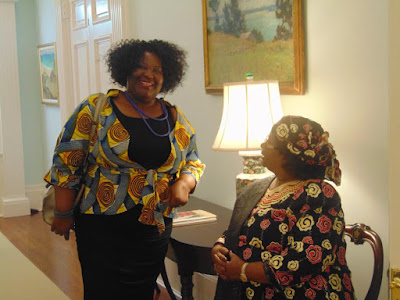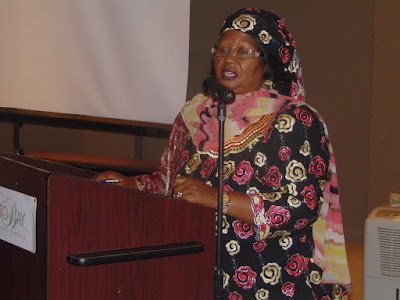Issues about gender equality, sexual and reproductive health (SRH), services and comprehensive sexuality education must be given special attention by the international community to ensure the attainment of the Sustainable Development Goals (SDGs) by 2030, Bermudian Governor John Rankin has said.
The Governor of Bermuda, who is the representative of the British monarch in the British overseas territory of Bermuda, was speaking at a reception he hosted at his official residence in Bermuda on Friday, December 9, 2016, in honour of former Malawi’s former President Joyce Banda and a group of diplomats representing country missions to the United Nations (UN) Headquarters in New York.
This was ahead of a high-level meeting on issues related to gender equality, women's and girls' human rights and sexual and reproductive health and rights (December 10-11, 2016) where Banda was Keynote Speaker.
Governor Rankin hailed the International Women's Health Coalition (IWHC) and International Planned Parenthood Federation (IPPF) for organizing the Bermuda meeting, noting that for people to attain the highest standard of health across the world, they must first be empowered to exercise choice in their sexual and reproductive lives and this can only be achieved when advocacy and education initiatives are heightened.
Speaking on Saturday at Grotto Bay Beach Resort, former President Banda noted that the meeting was a “testament of the incredibly relentless work done over the years by civil society, research and advocacy groups, governments, and policy-makers to bring the rightful relevance to the sexual rights and health of girls around the world”.
Banda spoke about the challenges that girls aged 0 to 10 years old face at household level and in the community that negatively affects their education and adulthood in the context of gender equality, women's and girls' human rights and sexual and reproductive health and rights.
“We should not wait until adolescence to advocate for the rights of the girl child. It is between ages 0 and 10 is when girls are molded by dangerous behaviors and mindsets about the value of a girl. It is at this age when underinvestment in the girl child’s education begins; where her sole destiny as future wife and mother are decided,” Banda said.
She cited harmful cultural practices, traditions and socialization norms within the household as some of the main challenges that negatively affect the growth and development of the girl child.
“When the incomes are low at household level, it is the boy who goes to school at the expense of the girl; the girl child is subjected to dangerous harmful practices and traditions and the trauma she is subjected to negatively affects her future,” Banda said.
Governments must renew their commitment to passing and enforcing laws to protect the girl child’s rights to safety and dignity and that the civil society, development partners, and local community leaders to engage in the tremendous undertaking of educating families and shifting broader mindsets and beliefs, she said.
“What we have is fundamentally a mindset challenge. We have discussed harmful cultural practices often in connection to other issues like education, gender based violence and discrimination. But we are yet to tackle it head on, which I know seems deeply overwhelming and impossible, but is in fact doable. How? The first step is to research how to better use existing power hierarchies at the community level to change behaviors.
“When I took office as President in 2012, 675 Malawian women died per 100,000 live births. In the rural areas where we saw the highest incidence of maternal death, there were many myths and taboos surrounding pregnancy, which often kept women from seeking proper healthcare and opting to deliver in their homes without trained birth attendants.
“In addition to investing in clinical infrastructure, our biggest challenge was to change mindsets and norms surrounding childbirth. To achieve this, we mobilized more than 12,000 traditional village leaders to educate women, demystify pregnancy, and enforce the government’s ban on home birth. Instead of criminalizing traditional birth attendants, we recruited them to act as community advisors for pregnant women and young girls,” said former President Banda.
Banda is currently a Distinguished Fellow at Woodrow Wilson Centre where her research tackles issues of women’s leadership as well as at the Center for Global Development (CGD) researching on girl education in Washington DC.
The Governor of Bermuda, who is the representative of the British monarch in the British overseas territory of Bermuda, was speaking at a reception he hosted at his official residence in Bermuda on Friday, December 9, 2016, in honour of former Malawi’s former President Joyce Banda and a group of diplomats representing country missions to the United Nations (UN) Headquarters in New York.
This was ahead of a high-level meeting on issues related to gender equality, women's and girls' human rights and sexual and reproductive health and rights (December 10-11, 2016) where Banda was Keynote Speaker.
Governor Rankin hailed the International Women's Health Coalition (IWHC) and International Planned Parenthood Federation (IPPF) for organizing the Bermuda meeting, noting that for people to attain the highest standard of health across the world, they must first be empowered to exercise choice in their sexual and reproductive lives and this can only be achieved when advocacy and education initiatives are heightened.
Speaking on Saturday at Grotto Bay Beach Resort, former President Banda noted that the meeting was a “testament of the incredibly relentless work done over the years by civil society, research and advocacy groups, governments, and policy-makers to bring the rightful relevance to the sexual rights and health of girls around the world”.
Banda spoke about the challenges that girls aged 0 to 10 years old face at household level and in the community that negatively affects their education and adulthood in the context of gender equality, women's and girls' human rights and sexual and reproductive health and rights.
“We should not wait until adolescence to advocate for the rights of the girl child. It is between ages 0 and 10 is when girls are molded by dangerous behaviors and mindsets about the value of a girl. It is at this age when underinvestment in the girl child’s education begins; where her sole destiny as future wife and mother are decided,” Banda said.
She cited harmful cultural practices, traditions and socialization norms within the household as some of the main challenges that negatively affect the growth and development of the girl child.
“When the incomes are low at household level, it is the boy who goes to school at the expense of the girl; the girl child is subjected to dangerous harmful practices and traditions and the trauma she is subjected to negatively affects her future,” Banda said.
Governments must renew their commitment to passing and enforcing laws to protect the girl child’s rights to safety and dignity and that the civil society, development partners, and local community leaders to engage in the tremendous undertaking of educating families and shifting broader mindsets and beliefs, she said.
“What we have is fundamentally a mindset challenge. We have discussed harmful cultural practices often in connection to other issues like education, gender based violence and discrimination. But we are yet to tackle it head on, which I know seems deeply overwhelming and impossible, but is in fact doable. How? The first step is to research how to better use existing power hierarchies at the community level to change behaviors.
“When I took office as President in 2012, 675 Malawian women died per 100,000 live births. In the rural areas where we saw the highest incidence of maternal death, there were many myths and taboos surrounding pregnancy, which often kept women from seeking proper healthcare and opting to deliver in their homes without trained birth attendants.
“In addition to investing in clinical infrastructure, our biggest challenge was to change mindsets and norms surrounding childbirth. To achieve this, we mobilized more than 12,000 traditional village leaders to educate women, demystify pregnancy, and enforce the government’s ban on home birth. Instead of criminalizing traditional birth attendants, we recruited them to act as community advisors for pregnant women and young girls,” said former President Banda.
Banda is currently a Distinguished Fellow at Woodrow Wilson Centre where her research tackles issues of women’s leadership as well as at the Center for Global Development (CGD) researching on girl education in Washington DC.



No comments:
Post a Comment